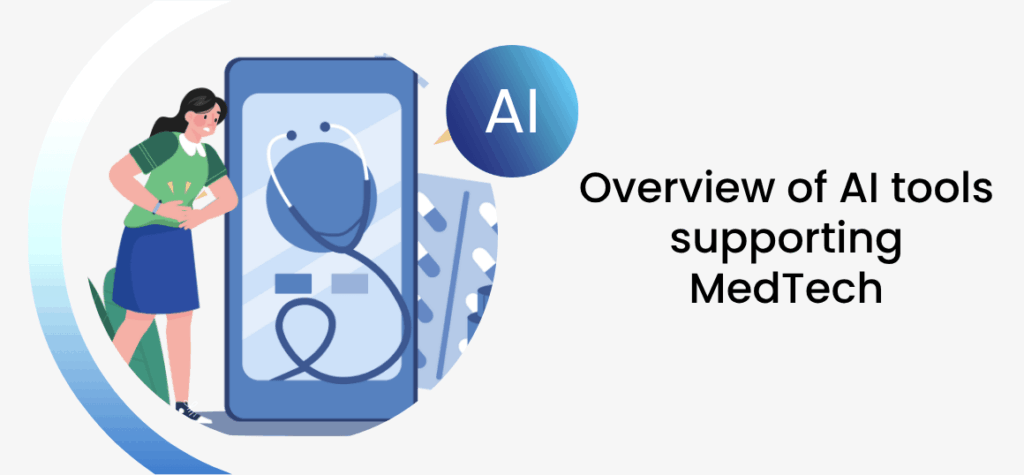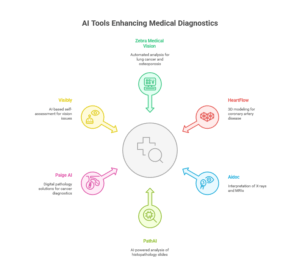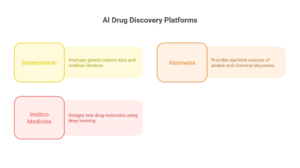Overview of AI tools supporting MedTech

Overview of AI tools supporting MedTech
Artificial intelligence is increasingly being adopted in the field of medicine. It proves effective in numerous areas, including patient diagnostics, appointment scheduling, and even the preparation and transmission of medical recommendations. These are just a few examples of how the medical sector is leveraging the potential of AI. In this article, we’ve compiled key information about modern technologies used daily in healthcare that support doctors and nurses in their routine work.
AI tools for electronic patient registration
One of the most common examples is AI tools designed for electronic patient registration. Medical voicebots are frequently used for this purpose. They can hold real-time conversations with patients and schedule appointments directly in a specialist’s calendar. A major advantage of AI is its ability to handle multiple conversations simultaneously, easing the workload of healthcare staff at registration desks. This enables patients to book appointments more quickly, saving valuable time and reducing frustration — leading to greater satisfaction with the services provided. Today, voicebots are successfullyautomating medical workflows, reducing the administrative burden on specialists. This gives doctors more time to focus on their patients.
Artificial intelligence in diagnostics
The field of medical imaging and digital pathology is evolving rapidly, aiming to improve the accuracy of diagnoses. Although the idea that AI will replace doctors is still a myth, in the area of imaging, it already serves as a valuable support tool. Still, AI-generated insights should never be treated as definitive. It’s essential that such technologies be used wisely and under the guidance of an experienced physician who can interpret AI recommendations critically — not follow them blindly. Some commonly used AI tools in medical imaging and digital pathology include:
- Zebra Medical Vision – automated analysis of medical scans for lung cancer, osteoporosis, and other diseases.
- HeartFlow – CT scan analysis and 3D modeling of the heart to assess coronary artery disease.
- Aidoc – interpretation of X-rays, MRIs, and CT scans to detect hemorrhages, brain injuries, or pulmonary embolisms.
- PathAI – AI-powered analysis of histopathology slides.
- Paige AI – digital pathology solutions for cancer diagnostics, especially for breast and prostate cancer.
- Visibly – an AI-based self-assessment tool for vision issues such as farsightedness, nearsightedness, and astigmatism.
In Poland, these technologies are not yet widely adopted, and diagnostic processes still rely heavily on traditional methods. However, it seems only a matter of time before selected tools from this list become more mainstream. Their effectiveness in clinical use will be key. Above all, patient health and safety must always remain the top priority.

AI innovations as clinical support for physicians
Another important area of artificial intelligence in medicine is supporting physicians in clinical and decision-making processes related to treatment implementation. AI proves useful in both standard procedures and emergency situations requiring rapid patient triage — the process of sorting patients based on the urgency of their medical condition. One noteworthy solution is Infermedica, which assists with patient symptom analysis. Another is IBM Watson Health, a powerful tool for analyzing patient data alongside vast libraries of scientific literature. It leverages AI to process large volumes of information in real time and generate personalized treatment recommendations. The development of AI in this domain can enhance physician effectiveness and enable tailored therapy that meets the unique needs of each patient. Notable solutions also include Google’s DeepMind Health, used for predicting kidney failure and analyzing post-surgical complications.
Faster analysis of collected data
A single human genome can contain up to 100 terabytes of raw data, making manual analysis virtually impossible. Traditional computing systems are also too slow and inefficient for such tasks. AI algorithms, however, can process this data up to 100 times faster than humans. This means AI tools are not only more efficient but will continue to outpace human capabilities as the technology advances. Faster DNA sequencing and genomic analysis of different ethnic groups also improve the accuracy of health-related insights. The more we know about a given population, the easier it becomes to correlate genetic patterns with specific diseases and to define preventive, diagnostic, and treatment guidelines. Certain AI systems are already being used to predict a patient’s risk of developing specific illnesses.
AI in drug development
Few people realize that AI has been used in pharmaceutical manufacturing for years. These systems learn from accumulated data and can perform complex calculations in real time. This capability is particularly useful in designing drug formulations. AI is also widely applied in the discovery of new molecular structures for pharmaceuticals. Some notable AI-powered tools used in the pharmaceutical industry include:
Porozmawiaj z naszym specjalistą
- BenevolentAI – a platform for analyzing genetic patient data and medical literature,
- Atomwise – provides real-time analysis of protein and chemical structures to match patients with suitable clinical trials,
- Insilico Medicine – a deep learning-based system used to design new drug molecules, offering invaluable support to pharmaceutical experts.
Of course, all these tools should be treated as support systems, not replacements for medical professionals. At this stage, the effectiveness of AI in medical data analysis and drug development is still under evaluation. Therefore, a cautious and informed approach is recommended. The coming years should be focused on in-depth testing and validation of these technologies.

Autonomous medical robots
Year by year, the potential for using autonomous medical robots in surgical procedures and patient room operations continues to grow. AI-controlled robots are already being tested and have demonstrated capabilities such as precise suturing of living tissue. One of the most innovative developments is remote surgery, where operations are performed from a distance using robotic systems. The first successful remote surgical procedure was carried out in Asia in 2023 and marked a major milestone. This area of medicine is expected to expand rapidly, with leading medtech companies investing heavily in AI to revolutionize patient care.
Remote monitoring of patient vital signs
AI also plays a crucial role in remotely monitoring patients’ vital signs. It can transmit real-time data to medical systems and detect alarming symptoms early. For example, it can alert both the patient and physician to the onset of conditions like atrial fibrillation, allowing for a faster response that could ultimately save lives in critical moments. Notable tools in this category include:
- Biofourmis – detects chronic disease flare-ups using sensors worn on the body,
- Current Health – enables remote monitoring of patient vitals,
- Fitbit – helps identify heart irregularities such as atrial fibrillation.
Automation of medical documentation and administration
AI tools in healthcare are also being used to manage medical documentation and patient data. Dedicated systems can securely store, organize, and generate reports from large volumes of data. This reduces the risk of human error and makes it easier for physicians and healthcare staff to find the information they need. By automating documentation and administrative processes, AI can help save valuable time and improve operational efficiency across medical facilities.
Cost optimization for MedTech companies and medical facilities
Well-selected and properly implemented AI tools do more than just improve service quality or enhance physician efficiency — they also support the healthcare system in optimizing operational costs for both medical facilities and medtech companies. AI can significantly improve inventory management for medications and medical supplies, as well as assist in demand and supply forecasting. With greater precision, it becomes possible to predict the need for specific pharmaceuticals over a given time frame. This not only helps hospitals better plan their orders, but also enables manufacturers to adjust production capacity accordingly. These are just a few examples of how advanced AI algorithms can streamline the healthcare supply chain, ultimately reducing associated costs.
We specialize in medical voicebots
Are you planning to leverage the power of artificial intelligence in your medical facility? At EasyCall, we specialize in implementing AI tools for healthcare, including voicebots designed to automate patient registration processes. With our solutions, you’ll save time and money, while also improving the quality of services provided to your patients. Our clients already include respected institutions such as Medic Park in Płock, Gizińscy Medical Center, and Sanitas Lekarze Specjaliści. Get in touch with one of our experts — we’ll present you with a tailored collaboration proposal that aligns with your facility’s needs and the challenges you’re facing.
